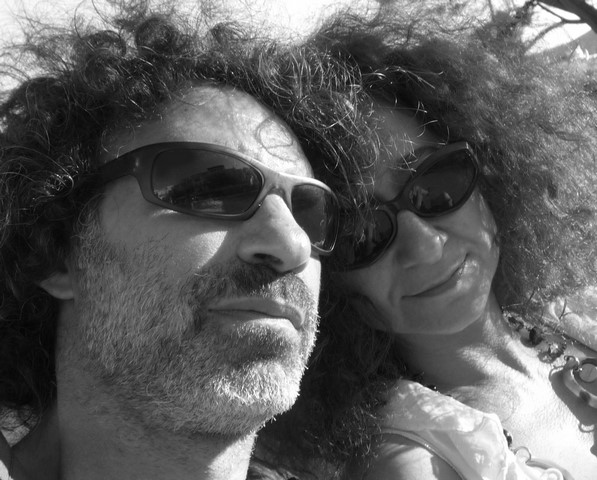about the production
The performative installation 33 RPM and a Few Seconds documents the sudden disappearance and subsequent suicide of Lebanese left-wing activist Diyaa Yamout. The only items present on stage are a table with two chairs, a computer showing his Facebook profile, a TV, a mobile phone and an answering machine. No actors enter the stage in the course of the installation. Yamout is nowhere and simultaneously everywhere, as he continues to exist in a virtual life after death. In the word of media, built in Yamout’s room out of electronic devices, every bit of information feels significant yet none reveals the definitive truth about him. Manipulation of reality and the disappearance of truth, which audiences confront during the sixty-minute running time of this performance, are preferred themes for the Lebanese creative duo Rabih Mroué and Lina Saneh.
Everything that plays out on stage seems entirely real – new comments on social media, TV footage reflecting Yamout’s disappearance as well as an answering machine filled with messages no one could answer. In fact, what we see is merely the digital representation of real life we are used to from the everyday setting of the internet and social media. Mroué and Saneh portray how modern digital technologies, which on the one hand are capable of faithfully reproducing real events, can on the other hand become means to manipulate reality. They shed light on the mechanism by which real life is falsified in the digital world. In the case of the story of Yamout’s disappearance, what we see is actually a fictitious archive of events documenting a past that never happened.
It is we who become the main characters in this work – we the audience, the only living beings in the closed space of the theatre hall during the real time of the performance. Like voyeurs, we enter the information bubble consisting of the fragments presented on stage and each of us constructs our own story. It is, however, completely up to us to accept or reject the rules of the game. In any event, this meticulously designed piece makes for an original experience.
The form of an installation without actors also changes our perception of the limits of contemporary theatre. Whereas in the past such ‘inanimate’ works were mostly consigned to the spaces of galleries, the turn that occurred in art in the course of the last century now brings live artists to galleries and the technological tools of the digital era on the theatrical stage. But the latter too can comment on the world and society we live in.
Ján Balaj
“They are to Beirut what the Wooster Group is to New York: a blend of avant-garde innovation, conceptual complexity and political urgency, all grounded in earthy humor.”
(New York Times)
“This setup reminds of the everyday situation by the table: we stare at a computer screen, refreshing the Facebook news feed, the TV runs in the background and the phone rings in between. Despite the absence of an actor over the whole 70-minute running time, the scene is surprisingly gripping. 33 RPM is not merely a work about politicisation and revolution in the Arab world but also a reflection on the medialisation of politics and the medialisation of time and space.”
(Leopold Lippert, nachtkritik.de)
creators
text and direction: Rabih Mroué & Lina Saneh
set design, graphics and animation: Samar Maakaroun
director of photography: Sarmad Louis
assistant technical production: Sarmad Louis & Thomas Köppel
translation: Ziad Nawfal
casting and production: Petra Serhal
editing: Najib Zeitouni & Sarmad Louis
co-production with the Kampnagel (Hamburg), Steirischer Herbst (Graz) and others
director

Rabih Mroué (1967) is a theatre director, actor, visual artist and playwright. He was born in Beirut and currently lives in Berlin. Although primarily a theatre-maker, he also creates videos, installations, photographs and is a contributor for The Drama Review / TDR (New York). He was among the founding members of the Beirut Art Center (BAC); in 2012 – 2015, he was fellow at the International Research Centre ‘Interweaving Performance Cultures’ at the FU Berlin. He works as a director at the Münchner Kammerspiele.
Lina Saneh (Majdalanie) (1966) is an actor, director and playwright. She was born in Beirut and lives in Berlin. In 2008 – 2013, she taught at University of Art and Design in Geneva, and also at DasArts (Amsterdam, 2012) and at the Goethe University (Frankfurt, 2016). She curated several multiedia projects such as Motion-less (Tanzquartier – Vienna, 2009), Vues (Kunsthalle – Mulhouse, 2015), Beyond Beirut (Mousonturm – Frankfurt, 2016) and Relatively Universal (HAU – Berlin, 2017).
Lina Saneh and Rabih Mroué began collaborating after they completed their studies in theatre. Their focus was on documentary theatre directly related to their home country and on experiments with various forms of dramatic art. Each is engaged in their own research, and together they carry out an authentic documentary investigation, which they subsequently transform into fiction in their own political productions.
Both of creators are presented in Slovakia for the first time.
Materiály k dispozícii
Video of the production: yes
Scripts of the production: SK, EN
If you are interested in these materials, write to archivy@nitrafest.sk
